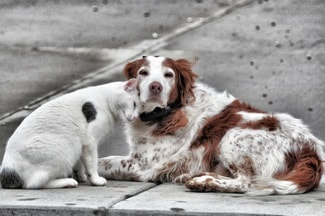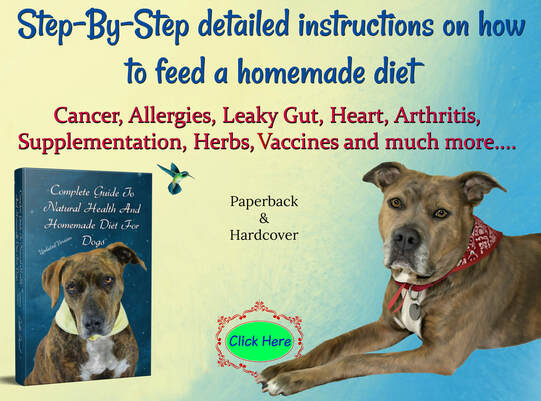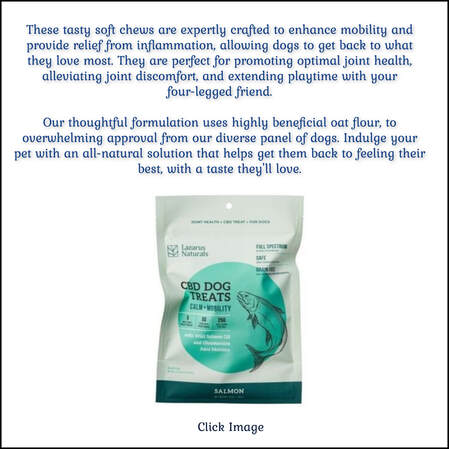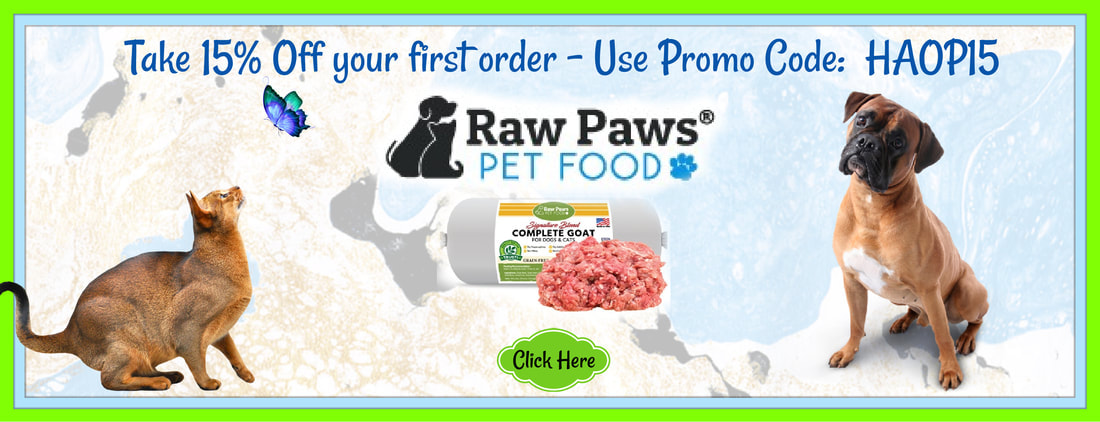
By: Dr. Karen Becker
Profit-hungry drug companies and vets are 'frightening' dog owners into inoculating their pets more often than necessary, according to U.K. based pet charity, Canine Health Concern.
Some puppies have developed conditions including autism and epilepsy after a raft of injections, it warns.
Catherine O'Driscoll, from the charity, said: “We are not anti-vaccination. What we are saying is that currently our pets are receiving far too many. The latest scientific research shows that after the first course of injections as a puppy most dogs are immune against these diseases for at least seven years, if not for life.”
Canine Health Concern maintains that some puppies and dogs have suffered dramatic changes in behavior or been diagnosed with cancer within months of receiving vaccine injections.
In a letter backed by 17 vets and other pet experts, the charity has called on the Veterinary Medicines Directorate, which monitors animal vaccines, to issue new advice on their use.
Profit-hungry drug companies and vets are 'frightening' dog owners into inoculating their pets more often than necessary, according to U.K. based pet charity, Canine Health Concern.
Some puppies have developed conditions including autism and epilepsy after a raft of injections, it warns.
Catherine O'Driscoll, from the charity, said: “We are not anti-vaccination. What we are saying is that currently our pets are receiving far too many. The latest scientific research shows that after the first course of injections as a puppy most dogs are immune against these diseases for at least seven years, if not for life.”
Canine Health Concern maintains that some puppies and dogs have suffered dramatic changes in behavior or been diagnosed with cancer within months of receiving vaccine injections.
In a letter backed by 17 vets and other pet experts, the charity has called on the Veterinary Medicines Directorate, which monitors animal vaccines, to issue new advice on their use.
Dr. Becker's Comments:
The current canine vaccine schedule used by many veterinarians calls for annual immunizations for the following diseases:
The annual schedule for cats includes vaccinations for:
Depending on risk factors, your vet might also suggest your kitty receive immunizations for chlamydia, feline infectious peritonitis (FIP) and ringworm. Additional dog vaccines include a giardia vaccine, as well as a vaccine against plaque and tartar! (Porphyromonas vaccine). A typical recommendation for a lifetime schedule of pet immunizations is at 6, 8, 10, 12, 14 and 16 weeks of age, with a booster at 12 months, and every year thereafter. Believe it or not, these recommendations weren’t developed based on any scientific research at all – they were simply “recommendations” in the purest sense of the word.
The current canine vaccine schedule used by many veterinarians calls for annual immunizations for the following diseases:
- Rabies
- Parvovirus
- Distemper
- Adenovirus
- Parainfluenza
- Leptospirosis
- Coronavirus
- Hepatitis
- Lyme (borelia)
- Bortadella (kennel cough)
The annual schedule for cats includes vaccinations for:
- Rabies
- Feline leukemia (FeLV)
- Distemper
- Rhinotracheitis
- Calcivirus
Depending on risk factors, your vet might also suggest your kitty receive immunizations for chlamydia, feline infectious peritonitis (FIP) and ringworm. Additional dog vaccines include a giardia vaccine, as well as a vaccine against plaque and tartar! (Porphyromonas vaccine). A typical recommendation for a lifetime schedule of pet immunizations is at 6, 8, 10, 12, 14 and 16 weeks of age, with a booster at 12 months, and every year thereafter. Believe it or not, these recommendations weren’t developed based on any scientific research at all – they were simply “recommendations” in the purest sense of the word.
These entirely unscientific recommendations were introduced by the USDA and vaccine manufacturers over 20 years ago, and many veterinarians continue to follow them today despite mounting concerns about the health risks associated with over-vaccinating.
The ‘Vaccination Business’ is a Major Profit Center for Many Veterinarians
Vet practices which depend on vaccination schedules to keep the doors open are typically small operations of one to three doctors that do not specialize or provide emergency services. The markup on rabies vaccines is astronomical – 2400 to 6200 percent in many cases. Estimates are that removing the one-year rabies vaccination/office visit for dogs alone could reduce a veterinarian’s income from $87,000 to $25,000.
The ‘Vaccination Business’ is a Major Profit Center for Many Veterinarians
Vet practices which depend on vaccination schedules to keep the doors open are typically small operations of one to three doctors that do not specialize or provide emergency services. The markup on rabies vaccines is astronomical – 2400 to 6200 percent in many cases. Estimates are that removing the one-year rabies vaccination/office visit for dogs alone could reduce a veterinarian’s income from $87,000 to $25,000.
And this example involves just one variety of one vaccine, and only dogs.One conservative estimate is that over half of dog visits and nearly three quarters of cat vet visits are for vaccinations. When you consider the markup on vaccines, the number of vet visits scheduled only for immunizations, and the typically short duration of those visits, the ‘vaccination business’ can prove to be very lucrative for veterinary practices that promote it. Veterinarians aren’t the only ones making a living off vaccination shots. The drug companies who manufacture vaccines have enjoyed an increase in sales of seven percent per year for the last 10 years. The U.S. is the largest consumer of vaccines by a huge margin over any other country.
How Re-Vaccinating Your Pet Can Harm His Health
Once your puppy or kitten is fully immunized against viruses, he is immune for years, and often for a lifetime.
Once your puppy or kitten is fully immunized against viruses, he is immune for years, and often for a lifetime.
Vaccination against bacterial pathogens creates a memory in your pet’s immune system that helps protect him if and when he’s exposed to dangerous organisms.
After your pet has received all his puppy shots, the antibodies he develops to the viruses he’s been immunized against will actually protect him from the same viruses introduced in future vaccinations.
In other words, if his puppy vaccinations are successful, his immune system response to subsequent vaccinations will fight off their effect, rendering them useless.
After your pet has received all his puppy shots, the antibodies he develops to the viruses he’s been immunized against will actually protect him from the same viruses introduced in future vaccinations.
In other words, if his puppy vaccinations are successful, his immune system response to subsequent vaccinations will fight off their effect, rendering them useless.
|
But vaccines, like any pharmaceutical drug, are not without side effects. So re-vaccinating for the same pathogens year after year is more than just a waste of your money – it also poses ever increasing risks to your pet’s health.
Many in the holistic veterinary community believe what vaccines do inside your pet’s body is change the form of diseases from acute to chronic. |
For example, the symptoms of the feline virus panleukopenia are GI-related and include intense and rapid onset of vomiting and diarrhea. Canine parvovirus has similar symptoms. Pets are routinely vaccinated for both these diseases, and the incidents of inflammatory bowel disease (IBD), a chronic autoimmune disease of the intestines, has been rapidly increasing in both cats and dogs. Coincidence? Unlikely.
There is also a potential connection between rabies vaccinations and an increase over the past 20 to 30 years in the number of fearful and aggressive companion animals.There is concern among many veterinary professionals that vaccination is a risk factor for serious autoimmune diseases such as the potentially fatal canine disorder known as autoimmune hemolytic anemia (AIHA).
Delayed vaccine reactions have been shown to cause thyroid disease, allergies, arthritis, tumors and seizures in both cats and dogs. There is also evidence of a connection between feline immunizations and incidents of vaccine-induced sarcomas (a type of cancerous tumor).
There is also a potential connection between rabies vaccinations and an increase over the past 20 to 30 years in the number of fearful and aggressive companion animals.There is concern among many veterinary professionals that vaccination is a risk factor for serious autoimmune diseases such as the potentially fatal canine disorder known as autoimmune hemolytic anemia (AIHA).
Delayed vaccine reactions have been shown to cause thyroid disease, allergies, arthritis, tumors and seizures in both cats and dogs. There is also evidence of a connection between feline immunizations and incidents of vaccine-induced sarcomas (a type of cancerous tumor).
How to Be a Smart Vaccine Consumer
1. Discuss what kinds of vaccines your pet needs, and how often, with your veterinarian. I strongly encourage you to seek out a holistic vet to care for your pet, and especially when it comes to vaccinations.
If you can’t locate a holistic vet in your area, make sure not to take your pet to any veterinary practice that promotes annual or more frequent re-vaccinations, or sells “puppy packages,” where you get all the vaccines for a “bargain price.” And don’t use any boarding facility, groomer, training facility or other animal service that requires you to vaccinate your pet more than necessary.
Ideally, well educated people in the pet community accept titers -- seek out and support these businesses.
2. Make sure each vaccine your dog or cat receives meets the following criteria:
It is for a serious disease (this eliminates many on the list immediately)
Your pet has the opportunity to be exposed to the disease (indoor cats have little to no exposure)
The vaccine is considered both effective and safe
If you do vaccinate your pet, ask your holistic vet to provide a homeopathic vaccine detox called Thuja (for all vaccines except Rabies)
3. Do not vaccinate your dog or cat if it has had a serious life-threatening vaccine reaction.
1. Discuss what kinds of vaccines your pet needs, and how often, with your veterinarian. I strongly encourage you to seek out a holistic vet to care for your pet, and especially when it comes to vaccinations.
If you can’t locate a holistic vet in your area, make sure not to take your pet to any veterinary practice that promotes annual or more frequent re-vaccinations, or sells “puppy packages,” where you get all the vaccines for a “bargain price.” And don’t use any boarding facility, groomer, training facility or other animal service that requires you to vaccinate your pet more than necessary.
Ideally, well educated people in the pet community accept titers -- seek out and support these businesses.
2. Make sure each vaccine your dog or cat receives meets the following criteria:
It is for a serious disease (this eliminates many on the list immediately)
Your pet has the opportunity to be exposed to the disease (indoor cats have little to no exposure)
The vaccine is considered both effective and safe
If you do vaccinate your pet, ask your holistic vet to provide a homeopathic vaccine detox called Thuja (for all vaccines except Rabies)
3. Do not vaccinate your dog or cat if it has had a serious life-threatening vaccine reaction.
4. Rabies vaccines are required by law. There are two varieties of the same vaccine – the 1-year type and the 3-year type. Ask for the 3-year vaccine, and ask your holistic vet about the homeopathic rabies vaccine detoxifier called Lyssin. There is also an immunologically less reactive vaccine called Purevax, but it’s only labeled for 1-year duration. If you are working with a holistic vet, ask to have the rabies vaccine given after 4 months of age, preferably closer to 6 months, to reduce possible reactions.
5. Insist on a Vaccine Titer Test. This test will help you and the doctor determine whether your pet has adequate immunological protection from previous vaccinations. Antibody levels can be measured from a blood draw. The type of titer that best assesses immune system response to vaccines is called the indirect immunofluorescent antibody (IFA) test.
Many veterinary state teaching hospitals will offer this test, as do private veterinary labs such as Antech or Idexx. Remember, you can’t add immunity to an already immune pet, so don’t keep vaccinating!
6. Discuss with your vet the risks vs. benefits of the vaccines you’re considering, as well as the likelihood your pet will be exposed to each disease.
7. If your cat lives indoors and never goes outside to risk exposure to infectious diseases, she does not need to be vaccinated annually. It is my belief that over-vaccination is one of the primary reasons the general health of house cats is deteriorating.
5. Insist on a Vaccine Titer Test. This test will help you and the doctor determine whether your pet has adequate immunological protection from previous vaccinations. Antibody levels can be measured from a blood draw. The type of titer that best assesses immune system response to vaccines is called the indirect immunofluorescent antibody (IFA) test.
Many veterinary state teaching hospitals will offer this test, as do private veterinary labs such as Antech or Idexx. Remember, you can’t add immunity to an already immune pet, so don’t keep vaccinating!
6. Discuss with your vet the risks vs. benefits of the vaccines you’re considering, as well as the likelihood your pet will be exposed to each disease.
7. If your cat lives indoors and never goes outside to risk exposure to infectious diseases, she does not need to be vaccinated annually. It is my belief that over-vaccination is one of the primary reasons the general health of house cats is deteriorating.
What About Puppy and Kitten Shots – Are They Really Safe?
Companion animals are not born with lifelong protective immunity, it must be established. And unlike many of the human infectious diseases that have been eradicated from this country, there are still lots of outbreaks of parvo and distemper across the country every year. As Dr. Ron Schultz (head of the Immunology Department of the University of Wisconsin Veterinary School) says (and I paraphrase), ideally “more immunized dogs would have less vaccines and less immunized dogs would have more vaccines.” In essence, vets still see lots of young pets die from preventable infectious diseases. The reason these diseases have not been eradicated is there is a pool of unvaccinated domesticated pets that are harboring these diseases.
Dr. Schultz argues that if these animals had been protected against disease, less disease would be transmitted. Likewise, if we would stop unnecessarily vaccinating already-protected pets, less degenerative disease would occur, and he’s right. At my clinic, Natural Pet Animal Hospital, we tailor make all vaccine protocols to minimize risk and maximize protection, taking into account the breed, background (was the pup orphaned, etc.), nutritional status and overall vitality. Most of the time, with healthy animals, we follow Dr. Schultz’s protocol of providing a single parvo and distemper vaccine at or before 12 weeks of age, and a set after 14 weeks of age. We titer pets 2 weeks after the last vaccine and if they have been successfully immunized, they are protected for life.
Nice, huh?
Should the titer tests indicate vaccine levels are low, we recommend a booster for only the specific virus or viruses that titered low. Hence the importance of working with a holistic vet that carries single vaccines.
We do not use or recommend combination vaccines (six to eight viruses in one shot), which is the traditional yearly booster. We also offer the option to boost a pet’s immunity naturally with homeopathic nosodes rather than traditional vaccination. Nosodes cannot be guaranteed to be effective and will not result in a measurable titer.
Companion animals are not born with lifelong protective immunity, it must be established. And unlike many of the human infectious diseases that have been eradicated from this country, there are still lots of outbreaks of parvo and distemper across the country every year. As Dr. Ron Schultz (head of the Immunology Department of the University of Wisconsin Veterinary School) says (and I paraphrase), ideally “more immunized dogs would have less vaccines and less immunized dogs would have more vaccines.” In essence, vets still see lots of young pets die from preventable infectious diseases. The reason these diseases have not been eradicated is there is a pool of unvaccinated domesticated pets that are harboring these diseases.
Dr. Schultz argues that if these animals had been protected against disease, less disease would be transmitted. Likewise, if we would stop unnecessarily vaccinating already-protected pets, less degenerative disease would occur, and he’s right. At my clinic, Natural Pet Animal Hospital, we tailor make all vaccine protocols to minimize risk and maximize protection, taking into account the breed, background (was the pup orphaned, etc.), nutritional status and overall vitality. Most of the time, with healthy animals, we follow Dr. Schultz’s protocol of providing a single parvo and distemper vaccine at or before 12 weeks of age, and a set after 14 weeks of age. We titer pets 2 weeks after the last vaccine and if they have been successfully immunized, they are protected for life.
Nice, huh?
Should the titer tests indicate vaccine levels are low, we recommend a booster for only the specific virus or viruses that titered low. Hence the importance of working with a holistic vet that carries single vaccines.
We do not use or recommend combination vaccines (six to eight viruses in one shot), which is the traditional yearly booster. We also offer the option to boost a pet’s immunity naturally with homeopathic nosodes rather than traditional vaccination. Nosodes cannot be guaranteed to be effective and will not result in a measurable titer.



















